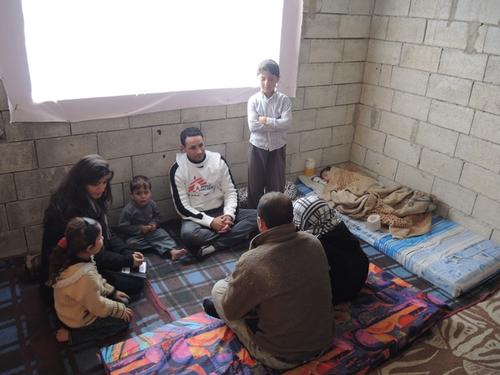For many refugees from Syria, getting a roof over their heads and keeping their families fed is a massive struggle. On World Refugee Day, Médecins Sans Frontières (MSF) warns that dire living conditions are affecting people’s health.
“After our house was destroyed in Syria eight months ago, we moved from one place to another to flee the war before crossing the Lebanese border,” says a woman named Wafa, who now lives with her family in an unfinished building in Al Marj, in Lebanon’s Bekaa Valley, the main entry point into the country for Syrians. “We were sleeping in the street when the owner of this building offered us the chance to come here. At night, the six of us share two thin mattresses and some blankets, my husband lying on one side and me on the other, covering our children. It’s all we have.”
Lack of adequate and affordable shelter
Finding accommodation has become almost impossible for the growing numbers of Syrian refugees in Lebanon. Some can call on people they know who are already in Lebanon, but most are not so fortunate. “The most difficult thing is to pay for the rent,” says Amar, a father of four who fled Damascus three months ago, arriving in Lebanon with little more than the clothes he was wearing. “We have been asked to pay up to $600 a month, but we are not tourists: we are people fleeing a war. Sometimes refugees are even asked to pay several months rent in advance.”
MSF has been scaling up the services it offers to Syrian refugees in Lebanon, but medical issues are only one of their concerns. “In Bekaa, refugees are scattered all over this vast area, which is one of the poorest of the country,” explains Tania Miorin, MSF’s field coordinator in the area. “Because of the huge needs and the lack of affordable accommodation, many refugees are forced to stay in unfinished buildings, garages or tents, sharing small spaces with other families.”
Already struggling to afford basic necessities, people are finding work hard to come by as well. “I do small jobs, whatever I can find on a daily basis,” says Wafa’s husband, Shadi. “And when I don’t find work, I beg.” One consequence is that people are willing to work for almost nothing, driving down wages for local residents in an already thin job market.
Profound health consequences
In the Bekaa Valley city of Baalbeck, some 400 Syrian refugees have gathered in a former school. Several families share what used to be classrooms, while others live in tents in the courtyard. “There can be up to 20 people living in one classroom, with plastic sheeting separations to accommodate two families,” says Khaled Osman, an MSF community health worker who regularly visits refugees to assess their needs. “People live, sleep and cook in the same room and up to ten families share one single bathroom which serves both as toilet and shower. There’s no storage space, so it’s very difficult to preserve food. This impacts on their health. It also affects their psychological state.”
A similar situation prevails in other parts of the country as well, and more Syrians are arriving every day, including Palestinians who had been living in Syria but fled to already overcrowded Palestinian camps in Lebanon. The effect on public health is readily apparent. “Approximately half of our patients suffer from respiratory infections due to the weather and difficult living conditions,” explains Dr Wael Harb, head of MSF’s medical activities in the Bekaa. “They have poor access to water and hygiene, so the risks of communicable diseases are very high. We see many dermatological infections, such as scabies, which is easily transmitted between family members.”
With summer arriving, temperatures are rising, which will increase the risk of water-borne diarrhoea outbreaks in shelters and settlements, already contending with very limited water and sanitation services. “We’re monitoring the situation in order to be ready to act quickly,” says Miorin.
Limited access to healthcare
Syrian refugees who are registered with the United Nations High Commissioner for Refugees (UNHCR) currently have to pay 25 per cent of their health costs, while the UNHCR pays for the rest. Even with the support, the costs are a significant burden, however. “We can barely pay for the rent and other life necessities for our children,” explains a mother of four in one of MSF’s clinics, where care is provided free-of-cost. “There was a health centre closer to our shelter, but I would have had to pay. I prefer buying bread for my children.”
Once registered, refugees are entitled to specific services from the UN’s implementing partners, but it can take up to two or three months before they are registered, time during which they cannot avail themselves of the available services. “We open our services to all people in need of medical care, regardless of their registration status,” says Fabio Forgione, MSF’s head of mission in Lebanon. “But health needs are far from covered. And the health coverage provided by the UNHCR and its partners has recently been decreased from 85 per cent to 75 per cent due to the shortage of available funds. This is likely to have a serious impact on proper access to needed healthcare for refugees, in particular when it comes to hospitalisation.”
In order to cope with the continuous influx of refugees and their growing medical needs, MSF has been adapting and expanding its programmes in the Bekaa Valley and other parts of the country, including the towns of Tripoli and Saida. The organisation also provides mental healthcare in various clinics to reinforce the coping skills of refugees and hosting communities, and it implemented a programme for chronic diseases and maternal healthcare in order to address the ever-increasing needs amongst refugees.



